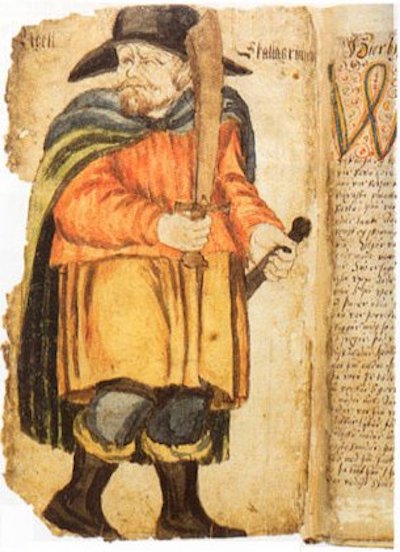Egil the Skald and the Power of Poetry
Episode #6 of the course Vikings: History and mindset by Tom Shippey
Welcome to Lesson 6!
Today, we will talk about Egil the Skald and the Viking poetry.
Poetry and the Mean Streak Again
One of the strange features of the Viking mindset was love of poetry.
It wasn’t poetry about dancing with the daffodils. “Eddic” poetry, old and anonymous, told myths and heroic legends. “Skaldic” poetry was produced by named poets or skalds in medieval Scandinavia, and their job was to praise the warlike deeds of their employers—even if, like Viking skald Egil Skallagrímsson, the subject of this lesson, they didn’t want to.

Picture of Egil in a 17th-century manuscript of Egils Saga.
Skaldic poetry was also very difficult and had to be done right. Alliteration here, full-rhyme there, half-rhyme there, etc. It was packed with allusions and circumlocutions. Poetry was not for free spirits. You needed know-how.
Moreover, poetry came from Odin, “the Mad One,” and part of madness is poetic inspiration. Another part of it is berserk fury.
Egil was too canny to be a berserk, but he was certainly dangerous to know. He was mean in both senses, merciless but also stingy with money. His last action before death was to take his miser’s hoard, along with two slaves to do the digging, and bury it. He came back, but the slaves didn’t and nor did the hoard. People are still looking for it in Mosfell ravine.
Egil was also famously ugly. His contemporaries thought he was strange because he was descended from trolls. The detailed description of his skull, in Egil’s saga, has, however, suggested to Jesse Byock, historian and archaeologist, that he suffered from Paget’s disease, which makes the bones of the skull keep growing till the neck can barely support it.
Egil, King Athelstan, and King Bloodaxe
Egil had a long career, but two high points happened in England.
By this time, England was split between Alfred’s descendants in the south and the Danelaw in the north and midlands. Egil took service with Alfred’s grandson, Athelstan, and in the saga account, he and his brother, Thorolf, won the battle of Brunanburh in 927 against a Celtic-Viking coalition. It cost Thorolf his life but Egil got a big payoff.
The Anglo-Saxons still had not taken York, and 20 years after Brunanburh, its Danish citizens called in Eric Bloodaxe to become their king. Eric was the son of King Harald Fairhair of Norway, and he got his nickname for the ruthless way he murdered his half-brothers after their father’s death. One surviving half-brother nevertheless chased Eric out.
By this time, he and Egil were deadly enemies: Egil had killed Eric’s ten-year-old son in a dispute (over, of course, money). Then Egil, trying his luck in England again, was shipwrecked and brought to Eric at York. As soon as he saw him, Eric said he must be killed. Egil’s cousin, Arinbjorn, managed to postpone execution but told Egil he’d better have a poem praising Eric ready in the morning.
A Poem for a Head
Egil said he hadn’t anything good to say about Eric, but was told to get on with it. His concentration was broken by a swallow chattering on his windowsill, and it was generally thought this was Queen Gunnhild, mother of the murdered boy, a notorious witch and shape-shifter.
Arinbjorn took guard against the swallow, and in the morning, Egil recited his poem to Eric. He called it “Head-Loosing.” This is a joke against himself. “Neck-Loosing” was the ceremony of freeing a slave, when they took his collar off. Egil means he is (kind of) a slave, acting under compulsion.
Eric listened to the poem. There were no mistakes. It celebrated Eric as an artist of battle, as Egil was an artist of poetry. Okay, he said, and let him off. This time. No one, of course, said anything silly about forgiveness.
Egil composed other great poems that survived, notably the lament for his sons, which is packed with “survivor guilt.” He is the classic Odinic hero but died of old age, knowing he would go to Hel, the gloomy realm of the ordinary dead, not to Valhalla, where those who died in battle went. His last words, like Ragnar’s, express neither grief nor fear.
Vikings were hard-headed businessmen but also cruel pagans, as the next lesson shows.
Recommended reading
Share with friends
